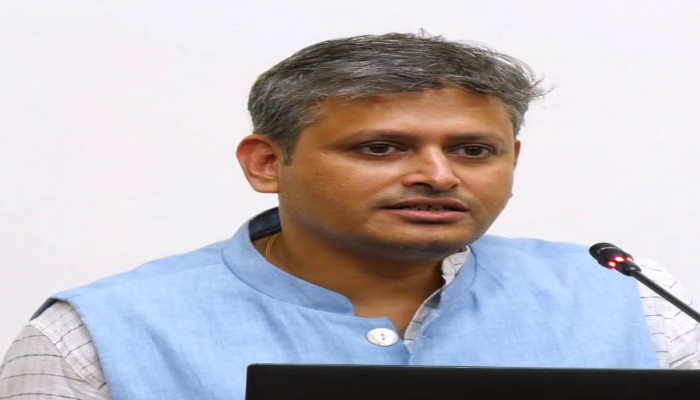MyInd Interview with Raghav Krishna on Building Bharatiya Narrative
- In
- 04:59 PM, Jan 03, 2024
- Ramaharitha Pusarla
Regaining the narrative allows India to challenge historical distortions, counter external narratives that may be detrimental to its interests, and foster a sense of national pride and unity.
Raghava Krishna carries 22 years of experience across game development and academia with expertise in leading creative product development Teams, Learning Design and Org Culture. He was the Development Director at Electronic Arts (EA Sports) where he led product operations for EA's mobile game development studio in Hyderabad.
After his corporate stint, he moved into Public Policy to engage with public policy. He was the co-founder and Associate Dean Academics at Rashtram School of Public Leadership. He is currently the Founder and CEO of Brhat Culture Creatives and Brhat Educational Trust with a focus on Cultural Storytelling, IKS-centered education, Public Policy and Leadership Development. As a student of Indic Knowledge Systems, he seeks to provide perspectives on tackling global challenges from an Indian civilizational worldview.
- “Until the lions have their own historians, the history of the hunt will always glorify the hunter”. Contorted Indian history aptly reflects this scenario. But what are we doing about it?
History writing in India has been a criminal project, which has sought to present history in a distorted manner with imposed Marxist lenses where binaries of oppressor-oppressed, privileged-underprivileged, etc., have long played across historical narratives. With education getting captured by Marxists, there has been almost no representation of any alternative voices in the mainstream historical narratives. Though the last few years have seen a change where people are now reviving historians like RC Majumdar, Radha Kumud Mukherjee, etc., apart from books from Meenakshi Jain, Vikram Sampath, Sai J. Deepak, etc., are getting a favourable response from the public. There have also been concerted efforts by independent voices on social media like Twitter, Facebook, etc., who are trying to present a factual history by doing meticulous research, as well as by countering propaganda pieces by established authors/historians. There has been another interesting development where independent organizations are exploring Soundarya-Bodh (beauty) in Indian cultural practices, performances, and rituals and linking it with everyday lives. We need a million iterations of this basic truth from new historians and sociologists to contemplate our history and our identities with courage and without shame. This is essential for our body politic to heal and to release us from the inter-generational trauma of two phases of colonization- Islamic and British.
- Unshackling the colonial discourse, Latin American countries and African countries are rescripting their own narrative. Where is India positioned in this regard?
India finds itself at a crucial juncture in unshackling the colonial discourse and reclaiming its narrative. Similar to Latin American and African countries, there is a growing awareness in India about the need to reinterpret history, culture, and civilization in a more authentic and unbiased manner. The efforts to break free from the colonial narrative are gaining momentum, as scholars, intellectuals, and independent voices strive to present a more nuanced and indigenous perspective. While challenges persist, the resurgence of interest in alternative historical narratives and the recognition of indigenous voices are indicative of a positive shift. The diversification of historical sources and the exploration of India's rich cultural heritage are essential steps towards reclaiming and rescripting the narrative.
- More than ever, why is it important for India, right now, to regain the narrative?
In the contemporary global context, the importance of India regaining control over its narrative cannot be overstated. The narratives surrounding a nation shape not only its internal cohesion but also its external image and influence. India, with its diverse history and cultural heritage, needs to present a narrative that reflects its unique identity and contributions to humanity. In an era dominated by information and communication, the ability to control one's narrative is a form of soft power. Regaining the narrative allows India to challenge historical distortions, counter external narratives that may be detrimental to its interests, and foster a sense of national pride and unity. It is crucial for projecting an authentic image on the global stage and shaping the discourse surrounding India's role in the world.
- People contend that Narendra Modi’s ascent to power as Prime Minister in 2014 has been the turning point. Do you agree, if yes, in what way is the post-2014 era different?
Yes, Narendra Modi's ascent to power in 2014 marked a significant turning point in India's political landscape, and it has had profound implications for the nation's narrative. The post-2014 era witnessed a shift in the political discourse, with an emphasis on nationalism, cultural pride, and a reassertion of traditional values. The government under Modi has shown a keen interest in promoting a more indigenous and culturally rooted historical perspective. Initiatives like the celebration of Yoga Day, emphasis on traditional knowledge systems, and the revival of cultural festivals have contributed to a narrative that aligns more closely with India's historical and cultural ethos.
Moreover, the government's support for research institutions and the promotion of alternative voices in history writing has encouraged a more diverse and inclusive understanding of India's past. The push for projects like the Swachh Bharat Abhiyan and the revival of historical sites has also contributed to a narrative that underscores India's cultural richness and historical continuity. While opinions on these changes may vary, there is no denying that the post-2014 era has brought a distinctive flavour to India's narrative, emphasizing a departure from certain narratives that were dominant in the past.
- Along with the hard power, strong nations have invested heavily in subtly constructing and building narratives. Are Indian political efforts commensurate with its diplomatic efforts to reshape perceptions?
India's political efforts to reshape perceptions are indeed gaining momentum, but there is still work to be done to align these efforts with the scale of the nation's diplomatic influence. While India has made strides in leveraging soft power through cultural diplomacy, historical narratives, and international collaborations, there is a need for a more cohesive and sustained approach.
Efforts such as the International Day of Yoga, the promotion of Ayurveda, and collaborations in the fields of art, literature, and education have contributed positively to India's global image. However, a more coordinated strategy, backed by substantial resources, is necessary to counteract narratives that may be at odds with India's interests. This includes actively engaging with international media, fostering cultural exchanges, and supporting educational programs that present a balanced and accurate portrayal of India's history and culture. By aligning political and diplomatic efforts, India can effectively shape narratives that reflect its values, contributions, and aspirations on the global stage.







Comments